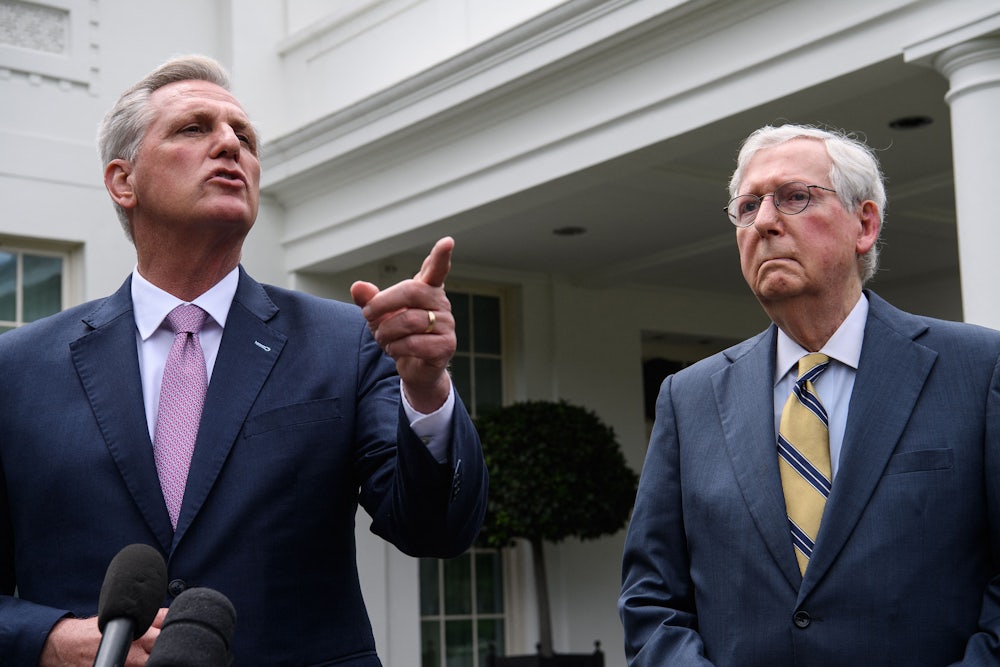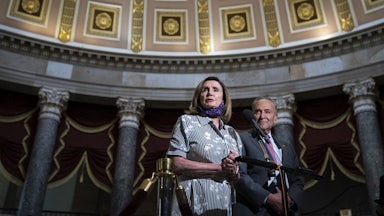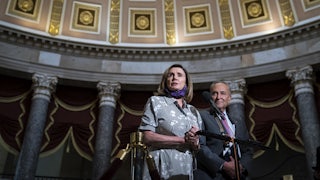As I warned last October, Republicans planted a fiscal time bomb two years ago in the Bipartisan Budget Act of 2019. What they did at the time was suspend the debt limit—an archaic fiscal tool that should have already died a thousand deaths—until July 31, 2021. Whatever the federal debt is on that date becomes the new debt limit, permitting no additional borrowing (although the Treasury can still extend the limit slightly using what are called “extraordinary measures”). There is no question that Republicans and perhaps a few Democrats will demand a pound of flesh for any debt limit increase. Although it eventually will be granted, Republicans likely will ensure that it runs out again just before the midterm elections.
There are lots of people who worry about the federal debt. While some concerns are not unreasonable, using the debt limit to control the debt has proven to be dysfunctional. In practice, it does nothing whatsoever to restrain the growth of debt and only enables demagoguery and insincerity. It’s simply a way for members of Congress to have it both ways—to vote for deficit-busting tax cuts and spending increases, while irresponsibly refusing to provide a method of financing the deficits that those votes necessarily created. A precise analogy would be to run up charges on one’s credit card and then refuse to pay the bill on the grounds of personal financial responsibility.
The utter absurdity of the debt limit as a tool of fiscal restraint has been obvious since it was created during World War I. Prior to that era, Congress had to authorize each individual bond offering by the U.S. Treasury, including interest rates, maturities, and other technical details. But during the war, federal borrowing was so great that this cumbersome method was impossible, so Congress granted the Treasury general borrowing authority subject to a limit.
Failure to raise the debt limit in a timely manner will lead to a default on the debt. That is because the Treasury would lack the cash flow to service the debt and would not be able to pay interest to bondholders or redeem bonds that have matured. Bondholders will react the same way as your bank will if you fail to pay your mortgage or credit card bill: Lawsuits will be filed and asset seizures instigated. (The government also has accounts payable, especially to recipients of Social Security, who will not take kindly to being stiffed by Uncle Sam.)
In recent years, a number of idiotic right-wingers have actually endorsed defaulting on the debt. Some argue that the people who lent money to the federal government were fools who deserve nothing. Others contend that it will force a massive slashing of federal spending and that the budget will be balanced overnight—bills could only be paid as tax revenue flows into the Treasury (which it does on a very irregular basis). They don’t care that the Treasury lacks the legal authority to decide who gets paid and who doesn’t or that there’s no rational way for it to do so if it had such authority.
Lest one think that advocates of debt default are just a fringe element, one of them, Mick Mulvaney, was actually appointed by Donald Trump to run the Office of Management and Budget. Indeed, Trump himself hinted that default was a valid strategy for reducing the debt during the 2016 campaign. (Trump was not the first president to suggest that debt default is a valid option: President Andrew Johnson was also sympathetic to the idea.)
Of course, when Trump was president, his treasury secretary routinely begged for increases in the debt limit, as all his predecessors did, using arguments identical to the ones that Democrats use when they are in power. It may be useful to review some of these Republican arguments. For example, Ronald Reagan said this on November 16, 1983:
This country now possesses the strongest credit in the world. The full consequences of a default—or even the serious prospect of default—by the United States are impossible to predict and awesome to contemplate. Denigration of the full faith and credit of the United States would have substantial effects on the domestic financial markets and on the value of the dollar in exchange markets. The Nation can ill afford to allow such a result. The risks, the costs, the disruptions, and the incalculable damage lead me to but one conclusion: the Senate must pass this legislation before the Congress adjourns.
On September 26, 1987, Reagan said this:
Congress consistently brings the Government to the edge of default before facing its responsibility. This brinkmanship threatens the holders of government bonds and those who rely on Social Security and veterans benefits. Interest rates would skyrocket, instability would occur in financial markets, and the Federal deficit would soar. The United States has a special responsibility to itself and the world to meet its obligations. It means we have a well-earned reputation for reliability and credibility—two things that set us apart from much of the world.
On September 27, 2007, Republican Senator Chuck Grassley of Iowa said it would be irresponsible not to raise the debt limit. (Republican George W. Bush was president at the time.) Said Grassley:
Increasing the debt limit is necessary to preserve the full faith and credit of the United States of America. Without an increase in this limit, our Government will face a choice between breaking the law by exceeding the legal limit or breaking faith with the investors by defaulting on the debt. Neither of those choices is acceptable, and we have never done them.
Critics sometimes object to raising the debt limit on grounds that it will allow the Government to borrow more money, but refusing to raise the debt limit is akin to refuse to pay your individual credit card bill after you have already gone shopping and bought something. We cannot pass tax bills and spending bills and then refuse to pay our bills. The time to control the debt is when we are voting on bills that actually create that debt.
Raising the debt limit is about meeting the obligations we have already incurred, it is that simple. We must meet our obligations. So I urge my colleagues to support this increase.
And lest one think that only Republicans are guilty of hypocrisy on the debt limit, these are the words of a certain Democratic senator from Illinois on March 16, 2006: “The fact that we are here today to debate raising America’s debt limit is a sign of leadership failure.… Increasing America’s debt weakens us domestically and internationally.… Washington is shifting the burden of bad choices today onto the backs of our children and grandchildren.” That was Barack Obama.
The national debt has been a political football throughout American history. In Federalist No. 30, Alexander Hamilton expressed fear that failure of the United States to pay its foreign debts threatened American sovereignty. (Note: About a third of U.S. bonds are now owned by foreigners.)
After the Civil War, Southerners objected strenuously to the fact that Union debts were repaid, while Confederate debts were repudiated. Fear that Congress might lack the votes to pay interest on the debt or repay principal, due to Southern obstinacy, led to the addition of an obscure clause to the Fourteenth Amendment preventing this from happening. It states: “The validity of the public debt of the United States, authorized by law, including debts incurred for payment of pensions and bounties for services in suppressing insurrection or rebellion, shall not be questioned.”
When Republicans came very, very close to defaulting on the debt 10 years ago, a number of legal scholars argued that the Fourteenth Amendment and the president’s inherent constitutional authority could be used by President Obama to simply ignore the debt limit and sell whatever bonds were necessary to finance the spending Congress had already authorized. These included Garret Epps of the University of Baltimore, Michael Abramowicz of George Washington University, Eric Posner of the University of Chicago and Adrian Vermeule of Harvard, Neil Buchanan of the University of Florida and Michael Dorf of Cornell, Jacob Charles of Duke University, and numerous others. Former President Bill Clinton agreed.
Unfortunately, President Obama and the Treasury Department took the view that invoking the Fourteenth Amendment was not a viable option and refused to pursue it. In the end, the Treasury did not default on the debt after a last-minute budget deal was reached.
The debt limit is a ridiculous way to deal with federal debt and borrowing. Even Republicans know this. In 2003, Republican economist Alan Greenspan, chairman of the Federal Reserve and a devotee of the libertarian novelist Ayn Rand, told Congress that the debt limit should be abolished. Said Greenspan: “In the Congress’s review of the mechanisms governing the budget process, you may want to reconsider whether the statutory limit on the public debt is a useful device. As a matter of arithmetic, the debt ceiling is either redundant or inconsistent with the paths of revenues and outlays you specify when you legislate a budget.”
Financial markets tend to be sanguine about the debt limit, believing that it will always be raised in the nick of time. This is naïve because the U.S. has defaulted in the past and because the insanity of today’s Republican Party really knows no limits. The large number of Republicans who still believe Trump won the election and that violent overthrow of the government is justified is proof of that.








